Paula Vince's Blog: The Vince Review, page 41
March 20, 2018
'All Passion Spent' by Vita Sackville-West
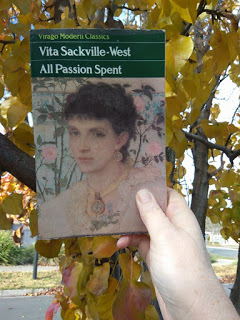
In 1860, as a young girl of 17, Lady Slane nurtures a secret, burning ambition—to become an artist. She becomes, instead, the wife of a great statesman and the mother of six children. Seventy years later, released by widowhood, and to the dismay of her pompous children, she abandons the family home for a tiny house in Hampstead. Here she recollects the dreams of youth, and revels in her newfound freedom with her odd assortment of companions: Genoux, her French maid; Mr. Bucktrout, her house agent; and a coffin maker who pictures people dead in order to reveal their true characters. And then there's Mr. FitzGeorge, an eccentric millionaire who met and loved her in India when she was young and very lovely. It is here in this world of her own that she finds a passion that comes only with the freedom to choose, and it is this, her greatest gift, that she passes on to the only one who can understand its value.
First published in 1931, Vita Sackville-West's masterpiece is the fictional companion to her great friend Virginia Woolf's A Room of One's Own.
MY THOUGHTS:
This is a thought-provoking story for anyone who wants to give themselves permission to live a simple, humble, contemplative life. Platitudes such as 'step out of your comfort zone' are so prevalent, we tend to take them on board as dogma without ever thinking about them. This story is all about asking, 'Hey, why should I step out?' Lady Slane is one person who realises that since life is so short, her comfort zone is the most appealing place to live. Her given name is Deborah, but nobody has used it for years. After a lifetime of doing what society expects of her, she makes a decision to retire from the public eye and live in a small house, out of the spotlight.
At the start, her husband, Henry Lyulph Holland, the first earl of Slane, has just passed away, aged 94. He was a former Prime Minister and Viceroy of India with an illustrious list of achievements and excellent reputation. Now that he's gone, his older children, senior citizens and big advocates of productive lives, assume that their gentle and pliable mother will be passed around between their homes. But the 88-year-old has other ideas.
Lady Slane realises that in all the hustle and bustle of helping her family look good, she's sacrificed many parts of her own true nature, including time to contemplate. 'In contemplation she could pierce to a happier life more truly than her children, who reckoned things by results and activities.' She and her maid,Genoux, realise their calm, new routine is more than enough, punctuated by small interests such as leisurely strolls and the arrival of tradesmen and parcels of books. 'Of such small things was her life now made.' It sounds pretty nice to me, and I kept scribbling down supportive quotes of her chosen lifestyle. 'She'd had enough in her life, of people whose worldly status was their passport to admission.'
I didn't give the nod to everything. Some of her musings made me a bit sad, such as thinking back on her husband and children as 'obstacles' that kept her from her true self. That's a hard word to use in this context, for innocent kids. She was the one who caved in to pressure to bring them up in a way the world would approve, but then decides she doesn't gel with the hoop-jumping people they grew into. Well, she helped shape them that way. I can't help feeling that when they grew up, she was treating them the same way they treated her, by thinking harsh things about them and not extending grace, since they were acting the best way they knew how, just like her. And sometimes when she made decisions just to annoy them, I wondered if she was such a nice, innocent little old lady after all.
Most readers would probably agree that the renewal of Lady Slane's friendship with Colonel FitzGeorge is one of the book's highlights, even though she barely remembered their mutual past to start with. Two people who briefly cross paths in their twenties now touch base almost sixty years later, and take up where they left off. I love how he reflects that the beauty in her face has changed, developing into something richer and deeper than youthful beauty.
In fact all the characters are elderly, with one notable exception towards the end. Some of Lady Slane's children are grandparents themselves, and Edith, the 'baby sister' is 60. She's an interesting character with an independent thought life I would have liked to see more of. Mr Bucktrout, Lady Slane's old landlord, is also quite a character on her own wavelength, and some of his quotes are the ones I liked most.
* Repose is one of the most important things, and yet how few people achieve it.
* My principle has always been that it's better to please one person a great deal than please a number of persons a little.
* I have given a great deal of offense in my life, but not one offensive instance do I repent.
* Although one cannot create an atmosphere, one can at least safeguard it against disturbances.
Maybe sticking to our decisions to live the gentle, quiet lives we dream of, instead of jumping through hoops, is really a bold leap out of the comfort zone of public approval. Insisting on your right to enjoy a passive, relaxed and unheralded life may take courage, in the face of criticism and rejection. What an irony that going with the flow, and taking the path of least resistance, may be the biggest energy sapper after all. I'm not going to wait until I'm old to heed Lady Slane's lesson.
Published on March 20, 2018 14:47
March 15, 2018
'Farmer Boy' by Laura Ingalls Wilder
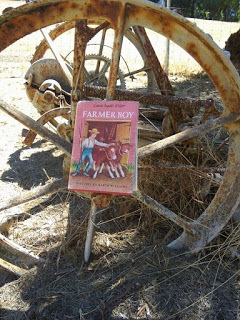
This year, I'm hosting a read-along of all of the Little House on the Prairie Books by Laura Ingalls Wilder, which you'll find here. We'd love you to read along and share your thoughts, if you feel so inclined. I haven't included a sign-up sheet of any sort, but kept it all very informal. Here we're up to the month of March.
Growing up on his family's farm in New York, Almanzo Wilder wishes for just one thing--his very own horse. But Father doesn't yet trust him with such a big responsibility. Almanzo needs to prove himself--but how?
MY THOUGHTS:
It's the story of Laura Ingalls Wilder's husband Almanzo when he was a boy. To sum up my feelings in a sentence, nothing beats sitting down to relax with a good book and read about others' hard work. I'd guess it was originally written as a companion to Laura's first book, Little House in the Big Woods, because it covers a year in the life of a family, following the cycles of the four seasons. But unlike the restless, roving Pa Ingalls, the Wilders had a flourishing, commercial farm. They weren't moving anywhere, and wouldn't want to!
One thing that stands out about James Wilder's farm is the huge variety. No specialisation for this man, he had all sorts going. Horses, cattle, sheep, potatoes, other veggies, cereal crops, orchards, you name it. I'm sure farms like his are almost extinct now. In modern times, people are seduced by the greater efficiency of growing or raising just one thing, and the profits that follow. Indeed, smaller hobby farmers can't compete with the produce of mass producers on the market. But I wonder if there's a high cost of soil depletion and healthy nutrient loss from overdoing it with a single commodity. It's sad to think that we're being led by the almighty dollar to our detriment, and that farms like the Wilders' no longer operate.
What pros they were too. Everything from their farm was naturally the very best. Not just any old sheep, but prize merinos. Also high pedigree Morgan horses, top quality potatoes, and super creamy butter that speaks for itself. No wonder the Wilders were highly respected in their community, and naturally reserved the best stables at church.
Almanzo makes a likable little hero, and his love for horses and food cannot be beaten. The story shows this boy going crazy about either one or the other.
To me, the horses come across fairly edgy and keyed up. Father wouldn't let his nine-year-old son near them, for fear that he'd teach them undesirable habits unwittingly. He was always dropping remarks like, 'One little mistake will ruin a fine colt.' They sound a bit like children. They'll pick up bad habits in a flash from some ratbag who's just mucking around, while good traits from someone with their best interests at heart are harder to stick. But young Almanzo decides that these high-maintenance critters are his delight.
 His other passion is food, and the amount he manages to stuff into his mouth during this story is astounding, but Mother keeps it coming. A typical winter breakfast, for example, seemed to be pancakes, sausage cakes, oatmeal, fried potato, buckwheat cakes, doughnuts, jellies and jam. They have my admiration for keeping up the pace day after day, when our morning ritual is pouring a bowl of cereal. Reading this book might even be a good strike in the war against junk food. If you start off feeling sorry for the Wilder kids for not having Mars Bars and McDonalds, you might well end up feeling jealous instead, because of the delicious turnovers and doughnuts we can read about but not taste.
His other passion is food, and the amount he manages to stuff into his mouth during this story is astounding, but Mother keeps it coming. A typical winter breakfast, for example, seemed to be pancakes, sausage cakes, oatmeal, fried potato, buckwheat cakes, doughnuts, jellies and jam. They have my admiration for keeping up the pace day after day, when our morning ritual is pouring a bowl of cereal. Reading this book might even be a good strike in the war against junk food. If you start off feeling sorry for the Wilder kids for not having Mars Bars and McDonalds, you might well end up feeling jealous instead, because of the delicious turnovers and doughnuts we can read about but not taste.It's a lovely picture of a boy with a healthy role model in his father, who he adores. James gives Almanzo a heavy dose of the Protestant Work Ethic, making sure his son knows that money = hard work. 'Any time you want to spend a nickel, stop and think how much work it takes to earn a dollar.' He also scoffs at time saving devices which may compromise quality, because 'all it saves is time. And what good is time with nothing to do?' It sinks in too. One the third day of the County Fair, the young boy decides with no prompting that he's had an overload of leisure and just wants to get back to work.
There are several interesting snippets. How about the Indian at the County Fair, who jumped onto the race track and kept up with the horses? The story tells us that he ran a two minute, forty second mile, and even Father was impressed. Well, I'd hope so, because if it's true, the guy smashed Sir Roger Bannister's four minute mile several decades before it was even set! Even in 1954, many people called a four minute mile a physically impossible feat. And today the current record stands at three minutes and 43 seconds.This shows that nameless wonders and unsung heroes pop up in every generation. Unless Almanzo remembered it with boyish exaggeration and told Laura, who took it on face value and wrote it down. But I prefer to believe the tale about that freakishly fast Indian runner. (Even though my family say it's absolutely impossible.)
Readers who work in the retail industry should get ready to be challenged. Almanzo's big brother Royal decides to be a store keeper, because he's over all the demands of farm work. It makes sense to me. He's a young man who's familiar with farming and knows what he's talking about, so it's not an uninformed whim on his part. Yet his parents think he's selling himself short, and their main reason for idolising their hard lifestyle comes back to their notion of freedom and independence.
They can't stand the thought of having to kowtow to customers and keep everyone happy, whether they like them or not. We're told, 'If Father goes out of his way to please anyone, it's only because he wants to.' He himself puts it this way. 'You work hard but you work as you please, and no man can tell you to go or come.' (Only the weather, the seasons, the hands of the clock and the demands of a crowd of animals are allowed to do that, but somehow James Wilder doesn't mind being pushed around by these things so much. But to me it shows that nobody is truly 'free', unless it's to choose who, or what will be our master.)
Mother knows exactly how to respond to Mr Paddock's generous offer to train Almanzo to be a wheelwright. 'Why would Almanzo want to live in town and cater to the whims of every Tom, Dick and Harry?' Poor Mr Paddock will have to look for another apprentice.
'Mother' is one of my favourite characters. The story doesn't even give her name, but a wiki search tells me it was Angeline. What a fantastic lady, proving that feminine skills are a super strength. She blitzes everything, from her wonderful cooking and awesome loom weaving to her way of speaking her mind and bartering with tradesmen. I love how she and her husband come across as partners, each upholding their own equally important end of home and farm. But most of all, I love how she liberates other females not to scoff at the domestic arts, as a life pursuit. Nobody could possibly look at Angeline Wilder and call her work drudgery. What a woman.
Another theme that keeps popping up is the true value of anyone's work or decisions being revealed in time. When lazy farmers scatter seed haphazardly so they can call it a day, their sloppiness will be obvious to everyone a few months later. In one of my favourite chapters, Almanzo decides to sneak some homemade toffee to his pet piglet, Lucy, but everyone finds out when her teeth get stuck together, and they have to pin her down so Royal can dislodge it. Oh oh, even loyal sister Alice is shocked that Almanzo would waste their sweets on a pig.
On the whole, Father is very matter-of-fact about the test of time, even regarding those he's most proud of.
Liveryman: That's a smart boy of yours.
Father: Time will show. Many a good beginning makes a bad ending. It remains to be seen how he turns out in the long run.
History showed his son suffered many tough times and hard knocks in the years ahead of him, with moments of heartache that might have broken his father's heart to see. But Almanzo came through with his faith, and his good, gentle character intact, so I'm sure James would have been perfectly satisfied with the way he turned out.
Published on March 15, 2018 14:50
March 11, 2018
We don't have to tackle Mount Everest

I was studying this huge mountain with my younger son. It's so impressive, being the world's tallest, at 8848 metres high. Apparently it still grows by about 0.25 inches each year, even at 60 million years old. It was first identified by a British survey team lead by George Everest in 1841, but not until 1953 did anyone manage to reach the summit. It was achieved by Sir Edmund Hillary from New Zealand and Tenzing Norgay, a Sherpa guide, making them instantly famous.
I applaud Junko Tabei, the first female to reach the top, not to mention Miura Yiuchiro, the oldest person to reach the top, aged 80, in May 2013. South Australia's Flinders Ranges' Mount Remarkable was almost too much for me, at 960 metres, and I was a fraction of the age. Over time, thousands of people have tried to reach the top of Everest, and many nameless folk have died making the attempt, in the name of thrill seeking or notoriety. My nephew's karate sensei climbed part of it. Even though he has the fitness level of an Olympic athlete, he didn't even attempt to make it all the way up. He told stories about the thinness of the atmosphere, and the many stops they would make just to get their breath back and conquer altitude sickness. Something about a challenge of that magnitude appeals to the adventurous streak that lies buried in all of us, some deeper than others.
Yet it would seem that, from space, it's a different story. From a vantage point of such magnitude, Mount Everest is merely part and parcel of the crust of the earth. In fact, it was even surprisingly difficult to single out. Russian cosmonaut, Valentin Lebedev, said, 'How many people dream of conquering Everest so they can look down from it, yet for us up above, it was difficult to locate.'
This God's eye perspective, so to speak, makes me feel peaceful, although I had to think about it to figure out why. It's to do with the fact that it is we humans who label things with significance and importance, by deeming them big or impressive from our vantage point. As it's not at all the same for God, we needn't worry about buying into all those competitions for status.
We make Everests out of so many things. Humans are those who spread the illusion that certain lines of work are far more illustrious than others, and that achieving celebrity-hood or stardom in some field is the pinnacle to strive for. I now like to think that from a lofty enough heavenly perspective, all the good we do just becomes part of the earth's fabric. That means we don't really have to bust our boilers, burst our blood vessels and strain our Type A personalities to impress people walking around down here, who share our limited focus.
Imagine some member of the angelic host whose vantage point is more like that of Lebedev and his fellow astronauts, saying, "Mother Teresa and Billy Graham have done wonderful things, but so have millions of others. It's just part of the total of what love-driven servants are doing everywhere. Look at Jane Doe, caring for her sick mother and working hard as a single parent to support her son through college. Or Joe Blogs the bus driver, sticking to road rules and greeting all his passengers cheerfully, day after day. It's all one and the same, and we love it."
If we've ever been afraid of never hearing, 'Well done, good and faithful servant,' thinking our work is too little or measly to justify the space we take, it might be time to get over our Mount Everest syndrome. When I finish writing this blog post, I'm going to go and clean my kitchen, have a walk with my son, and help my daughter prepare some food for her youth group. Later I'll work on a couple of book reviews. I'll have to remind myself that even though these things aren't Mount Everest, they are all adding to crust of love-driven deeds that makes the earth a great place to live. If we tend to get discouraged because we think we're not making a ripple, then maybe it's a sign that we should stop thinking in terms of being considered remarkable or measuring up to some standard.
Published on March 11, 2018 11:00
March 1, 2018
Several Super Scientists
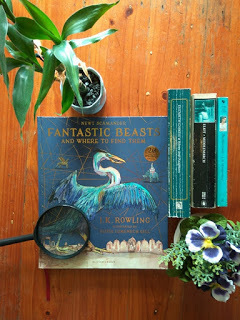
I was thinking how scientist characters tend to draw us in through both books and screen. There's something appealing about their brilliant and inquiring minds. The stories in which they feature tend to have interesting subject matter, and maybe they make us feel a tad smarter ourselves by reading about them. Several of the examples that sprang to my mind are so personally appealing, I was on the verge of calling this list, 'sexy scientists'. Here they are.
I'll begin with the natural history dudes. These guys are really into flora and fauna.
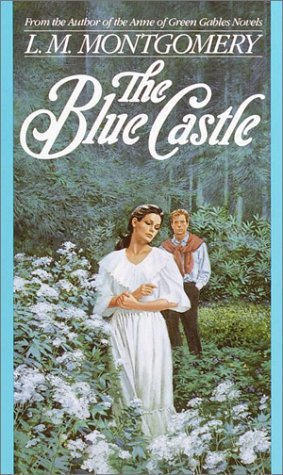 Barney Snaith
Barney SnaithArguably one of L.M. Montgomery's most successful and appealing heroes, he lives out in the forest and writes books about the great outdoors, using the pseudonym John Foster. Valancy Stirling has no idea that when she falls in love with Barney, she's also falling for her favourite author. He always makes an effort to throw her off the scent by criticising 'that writer' as a charlatan whenever he can. (My review is here.)
 Roger Hamley
Roger Hamley This earthy young man delves into the world of nature to the extent that he knows it as well as his own face in the mirror. His family considers his passion a major time waster, until he gets sponsored to take a major expedition to Africa to study plants and critters. It's a huge deal in the Victorian era, when men like Charles Darwin are doing the same thing, and there's no guarantee that they'll return alive. (My review is here.)
Newt Scamander
The most famous naturalist of the magical world, he's also beloved by many muggles who think he's just gorgeous. He also wrote the text book based on his fieldwork, Magical Beasts and Where to Find Them, which is used by all Hogwarts students in their studies.
 Reverend Camden Farebrother
Reverend Camden Farebrother More of a wannabe scientist than a legitimate one, this poor old pastor crams his study with samples beneath microscopes, because they really turn him on. Since his widowed mother and spinster sisters depend on him, he can't afford to indulge his passion full time. (My review is here.)

John Gould
This novel is really about his wife, but the birdman himself has plenty of appeal in a driven, fanatical sort of way. Based on real personal history, he brought his wife around the globe to Australia to help him indulge his passion for birds. He adores them enough to kill and stuff them in a flash, whenever he gets the chance. (My review is here.)
Next are the biological dudes who major on the human body, which makes them deliciously creepy when the story requires.
 Victor Frankenstein
Victor FrankensteinThis handsome young genius manages to fulfil his dream of playing God. He stitches together a brand new human-like being from bits and pieces he digs up in graveyards, and somehow breathes life into it. But his astounding feat returns to haunt him. Full of anguish at having ever been created, the hideous monster strikes out against what his creator loves most in the world.
Tertius Lydgate
A new doctor in Middlemarch, the good-looking and earnest young man dreams of making amazing medical breakthroughs to help mankind. As a boy, he looked into a book of anatomy, and discovered his purpose in a flash. Yet he doesn't reckon upon small town prejudice. The people who are grossed out by his habit of examining dead bodies are just the start of all he has to deal with. (See my link to Farebrother, since they come from the same book.)
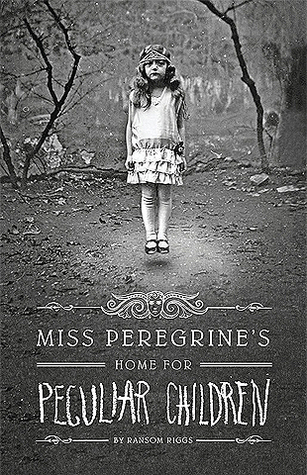
Enoch
I'm going to call this young boy a scientist, although his peculiarity is more along the lines of a freaky gift. He can rip hearts out of living beings to animate dead ones for the short term. And believe it or not, there are times when Enoch's skill comes in very handy. (My review is here.)
Then there's the inventor type, or gadget guys, who make all sorts of weird, mechanical contraptions, that cause serious trouble and mayhem. The majority of those I thought of tend to be in sitcoms and movies rather than books. Maybe this is because their particular branch of science has the potential to be a good spectacle.
Professor Wayne Szalinksy
His shrinking machine was a fabulous achievement, but something so dangerous shouldn't have been left lying around for unsuspecting family members to blunder into. What a mess! Also, he's a lesson to us all to never give up and assume failure prematurely. His lack of self confidence caused major trouble in Honey, I Shrunk the Kids.
Flint Lockwood
I love this geeky, awkward little dude from Cloudy with a chance of Meatballs. He lived a lonesome life, always at odds with his father and shunned by others. The machine he'd hoped would win him respect and fix all his social troubles ended up plunging him in boiling hot water.
The Professor
He can work wonders with a bit of primitive technology and whatever natural material is on hand, such as coconut shells. But it's never enough to get them all off the island! At least he was admired by lady viewers as the sexiest castaway, but didn't really have a lot of competition in Gilligan, the Skipper and Mr Howell.
The Time Traveller
A gentleman scientist from the Victorian era, he built the incredible machine which enabled him to visit many different time periods. Then he returns to his own era to wow gentry in their drawing rooms.

The Big Bang Theory
I'm drawing closer to my ultimate super scientist, but first I'll award the runners up. You've got to spare a thought for these wacky geeks; physicists Leonard and Sheldon, aerospace engineer Howard, and astrophysicist Raj. What they collectively lack in tact, social skills, and conventional coolness, they certainly make up for in brainy brilliance. (Incidentally, remember the episode where they get hold of the actual time machine, from the movie based on H.G. Wells' book?)
And now for the big drum roll for number One on my list...
Mark Watney
 I've got to make him tops because he's such an all-round legend. An astronaut botanist, he was abandoned on a mission to Mars by his fellow crew, who assumed he was dead. He manages to keep himself alive by drawing on all sorts of scientific disciplines which aren't even his specialties, such as Physics, Chemistry and Engineering. He's forced to snatch every bit of trivia floating through his head to become an instant expert, just to survive another day. And most amazing of all, he keeps his sense of humour intact throughout his whole ordeal. (My review is here.)
I've got to make him tops because he's such an all-round legend. An astronaut botanist, he was abandoned on a mission to Mars by his fellow crew, who assumed he was dead. He manages to keep himself alive by drawing on all sorts of scientific disciplines which aren't even his specialties, such as Physics, Chemistry and Engineering. He's forced to snatch every bit of trivia floating through his head to become an instant expert, just to survive another day. And most amazing of all, he keeps his sense of humour intact throughout his whole ordeal. (My review is here.)Did you notice the same concerning, in-your-face thing I did after my brainstorm? Without exception, all on my list are male. I guess that in the past, when several of the classics were written, science really was a male dominated field, but interestingly, the tradition has seemed to cling. Where are the Marie Curies, Rachel Carsons, Jane Goodalls and Dian Fosseys of fiction? I think I've set myself a really tricky challenge for a future post, and hope there are enough for a list.
As usual, if you can think of any other examples you love, either male or female, please add them in the comments.
Published on March 01, 2018 10:00
February 26, 2018
'Breakfast at Tiffany's' by Truman Capote
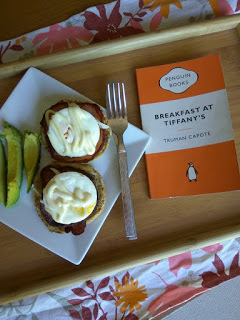
In this seductive, wistful masterpiece, Truman Capote created a woman whose name has entered the American idiom and whose style is a part of the literary landscape. Holly Golightly knows that nothing bad can ever happen to you at Tiffany's; her poignancy, wit, and naïveté continue to charm.
MY THOUGHTS:
This is my choice for the 20th century classic category of the 2018 Back to the Classics Challenge.
It's set in a New York apartment block during the second World War. A young aspiring writer finds himself falling for a mystery girl who lives on the floor above his. But the charismatic Holly Golightly has secrets, two of which are brought to light during the course of the novel. And they are clearly intended to make the reader say, 'Whoa!'
Holly is THE character around which the book revolves. Others love or hate her, but nobody is indifferent. She's the sort of person who will impose on somebody, then get prickly when he shows a subsequent interest in her background. Others may resent that, but our smitten young narrator simply takes it as a challenge. To me,Truman Capote's writing style seems more noteworthy than the story itself. His sparing prose has plenty of clever imagery, and a skillful way of making us sense things that aren't stated outright.
For example, Holly is all about colour and movement. We deduce this from the way she dresses, her apartment's 'fly-by-night' look, and simply what she's written on her card, 'Holiday Golightly, travelling.' It all gives the impression that she's not static, but fluid verging on restless. And it's reinforced by a number of casual references all through, such as her avoidance of the zoo because she hates to see creatures caged. Capote pulls this off with a minimum of words, because the whole story is over in just 100 pages.
Some of the minor characters are summed up in one or two revealing sentences, or even just a phrase. Rusty Trawler, her paunchy, wealthy middle-aged admirer, is a 'preserved infant.' The Brazilian Jose seems as out of place in their company as 'a violin in a jazz band.' And Mag Wildwood is a 'triumph over ugliness' since she accentuates her supposed defects rather than hiding them. It's easy to admire the way Capote saves space on descriptions, yet still makes his point.
The title may be a bit misleading. I think there's something alluring about the mention of food on a cover. Maybe it gives the impression there'll be some homely warmth. Yet nobody in the novel has a meal at Tiffany's Department Store. Holly simply mentions it in passing as one of her aspirations.
But even that turns out to be one of Capote's quick, subtle hints about the flip sides of her character, especially when snippets of her background are revealed. Holly is a girl who has the drive to leave an undesirable situation in search of something better, and the simple opulence of a department store during the war, with luxuries she can't afford, is enough to be her guiding star. I think we're meant to think that she has plenty of drive and gumption, but also naive idealism.
It's one of those stories where the movie possibly surpasses the fame of the book, because the lead role is well cast. I've never even seen it, but it's hard not to picture Audrey Hepburn's pixie face and little black dress as I read, just through taking on the hype over the years. It sounds like Hepburn must have nailed the dual sides of Holly's character; coming across both determined and delicate just by being herself. Holly Golightly could be a hardened criminal, yet she might simply be an innocent girl, dragged into something over her head. I'm sure Hepburn's is the name that springs instantly to most people's minds when someone says, 'Breakfast at Tiffany's' even more than the author's. I put it to the test, and my family had never heard of Truman Capote.
Overall, I wasn't crazy about the plot. My favourite stories are usually longer, not so up-in-the-air, and not focused on just one character. 'Fred' reveals nothing about himself at all. Although he keeps repeating that it's not really about him, it might have been nice to at least know his name. As for Holly, well meh, I didn't get fond enough of the mystery girl to care much what happened to her when she made her secret disappearance. She's always condescending to the narrator, which grated on me. I wonder if I'm in the minority when I say I found the book pretty forgettable on the whole. The shortness is all that saved it from two stars, since it was too short to put aside. Sure, Capote's clever writing was good, but since he didn't intrigue me with his characters, then so what? If you want to give it a try, at least it'll be over quickly if you don't like it. I think the best character is the orange cat.
Published on February 26, 2018 10:00
February 15, 2018
Taking a short break for moving
I'll be back blogging as soon as I can. Meanwhile, here's what we'll be occupied with for the next week or so. This is hard to believe, surrounded by boxes in our old home with cupboards empty, but next time you hear from me, we should be settled into our brand new home.


Looking forward to seeing you on the other side of the chaos here!


Looking forward to seeing you on the other side of the chaos here!
Published on February 15, 2018 18:20
February 12, 2018
'Little House on the Prairie' by Laura Ingalls Wilder
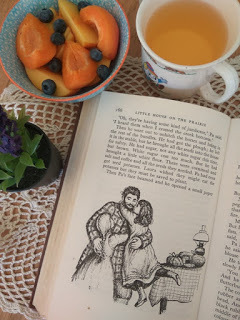
This year, I'm hosting a read-along of all of the Little House on the Prairie Books by Laura Ingalls Wilder, which you'll find here. We'd love you to read along and share your thoughts, if you feel so inclined. I haven't included a sign-up sheet of any sort, but kept it all very informal. Here we're up to the month of February.
* * *
The adventures continue for Laura Ingalls and her family as they leave their little house in the Big Woods of Wisconsin and set out for the big skies of the Kansas Territory. They travel for many days in their covered wagon until they find the best spot to build their house. Soon they are planting and plowing, hunting wild ducks and turkeys, and gathering grass for their cows. Just when they begin to feel settled, they are caught in the middle of a dangerous conflict.
MY THOUGHTS:
It's Laura's second book, in which she writes about another year in the life of her family. They are off in their covered wagon to settle in Indian Country, because the Big Woods are now too crowded for Pa. He's lured by the promise of a treeless, level country with thick wildlife, and she describes the fertile openness and solitude of the wide prairie beautifully. Their small family unit gets along well together, savouring the little things. When Ma presses each loaf of cornbread flat for the coals, Pa says he wants no other seasoning than her hand print :) And in return, she calls the comfort of the bed and rocking chair he makes her, 'almost sinful.' Getting squares of glass for their windows is cause for a family celebration, and the girls' joy knows no bounds when they get tin cups, candy canes, little cakes and coins for Christmas.
However, Laura continues her own private quest to match the perfection of Mary. When she feels shown-up, her natural instinct is still to lash out with a slap, but she's learned that's strictly forbidden. (See Little House in the Big Woods.) She decides to muster her willpower to compete instead, but it's a losing battle, because Mary has set the bar so high. For all her good intentions, poor Laura crashes and burns at times, such as the moment she yearns for Pa to bring her a little, black-eyed papoose.
But chinks in Mary's exemplary exterior show through in this book, proving that she's only human like the rest of us. A great example is her tendency to freeze up and become helpless whenever she's scared. Poor Mary.
 Heroes show up in the unlikeliest, most remote spots, including men who saved their lives outright. There's Dr Tan, the negro doctor who cured them from malaria, and Soldat du Chene, the tall, French-speaking Indian from the Osage tribe who talked thousands of others out of murdering the settlers. Pa himself always rises to the occasion, such as dragging unconscious Mr Scott from the bottom of the partially completed well. (Perhaps sinking to the occasion is more accurate in that example.) And one of my favourite heroes is Mr Edwards, the bachelor and legend who cared so much about making Christmas special for two little girls that he risked his life to swim across a raging creek to bring them presents from Santa.
Heroes show up in the unlikeliest, most remote spots, including men who saved their lives outright. There's Dr Tan, the negro doctor who cured them from malaria, and Soldat du Chene, the tall, French-speaking Indian from the Osage tribe who talked thousands of others out of murdering the settlers. Pa himself always rises to the occasion, such as dragging unconscious Mr Scott from the bottom of the partially completed well. (Perhaps sinking to the occasion is more accurate in that example.) And one of my favourite heroes is Mr Edwards, the bachelor and legend who cared so much about making Christmas special for two little girls that he risked his life to swim across a raging creek to bring them presents from Santa.But although it's another beautiful family tale, modern readers can't ignore the elephant in the room. The Ingalls family was involved in something pretty dodgy. The government had promised to clear the Indians out of their ancestral land to open it up for settlers, and Pa put up his hand to say, 'Yes please!' Arguably what he should have said was, 'No thanks, being part of something so unethical would hang heavily on my conscience for the rest of my life.'
He does come across as respectful of their culture and optimistic that they could all get along. He probably reasoned that they were all human, but that's like goldfish setting their aquarium among sharks because they're all fish, or canaries nesting among eagles because they're all birds. To imagine that two distinct communities with alien values and poles-apart cognitive habits can suddenly live side by side is a recipe for disaster. Even though Pa is careful to treat them courteously, there's always a sense that he's just waiting to be rid of them. 'Indians are always moved on,' he says. Or, 'They should have the sense to know when they're licked.'
I wonder if he ever considered how he'd feel if the Indians were given a mandate to lob in the middle of the Big Woods of Wisconsin and start pushing his extended family back. But failure to consider somebody else's former claim was characteristic of many nineteenth century settlers.
The voice of westernisation may be best expressed by their neighbour Mrs Scott. 'They won't do anything with the country themselves but roam around in it. It belongs to folks that'll farm it. That's only common sense and justice.' Even her assumption that farming is better for land over time than leaving it in its lush natural state is pure colonialism. It's easy to see why the Native Americans were incensed by this form of 'justice.'
So there's an ominous thread running through the whole story, all because the white settlers didn't 'Do unto others', although it never occurred to them that they should. The Ingalls' are living in the land of their fondest dreams, but have to put up with an Indian path running close by their house. Poor Jack the bulldog has to be permanently chained to the house, and Ma must get used to interlopers casually wandering into her home to steal whatever they please. Keeping important supplies in a padlocked cupboard is just a band-aid solution for the deeper, more sinister problem. There's always a sense that the uneasy truce won't last forever.
How frightening it was when the Indians' antagonism reached boiling point. The vulnerable Ingalls family sat in their tiny house surrounded by savage war cries, knowing full well how defenseless they'd be against a crowd of warriors bent on massacre. Six-year-old Laura remembered it like this. 'A nightmare is not so terrible as that night was. A nightmare is only a dream, and when it is worst you wake up. But this was real and Laura could not wake up.' She, Mary and Carrie would have been the most innocent victims had the worst occurred, as they were brought unwittingly to live there by the parents they trusted.
My heart ached for the terrible blow inflicted on Pa and Ma, when they were compelled to leave their nice little home with its freshly planted garden behind. For a man whose mottoes included, 'Better to be safe than sorry,' perhaps moving there in the first place wasn't one of Pa's finest ideas. But I'm sure they were well aware how lucky they were to have escaped with their lives. And their natural optimism is still shown to be firmly intact at the end.
Ma: A whole year gone, Charles.
Pa: What's a year amount to? We have all the time there is.
Next up will be On the Banks of Plum Creek.
Published on February 12, 2018 10:00
February 6, 2018
'Children of the New Forest' by Captain Frederick Marryat
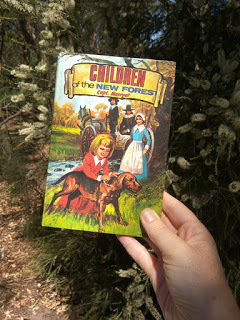
In The Children of the New Forest, Marryat describes the trials and triumphs of the four Beverley children, orphaned during the English Civil War and forced to take refuge with a poor woodsman in the New Forest. This is the first annotated edition of a great children's classic, which has retained its popularity since 1847.
MY THOUGHTS:
I chose this title to fit into the category called a re-read of your favourite classic, for the 2018 Back to the Classics Challenge. I adored this book when I was in Year 9 at High School. I read it through several times, daydreamed about it, recommended it to others, and even tried to draw pictures of the main characters. But I never read it to my own kids since they strongly objected to the title and cover design. (More about their assumptions here. Throughout this review, I'll share several alternative covers I found, but I'm sure none of them would have impressed my fussy mob any more.) So this was my first read since childhood. It made me a bit nervous, as it's a sad let-down when things don't live up to our rosy memories. But I was relieved. Whew!
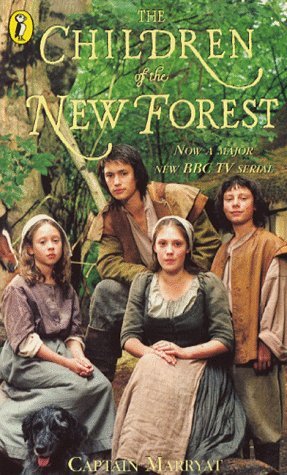 It begins with a huge event that draws us right in. The time period is the English Civil War, and the king's troops, known as the Cavaliers are fighting against Parliament and the supporters of Oliver Cromwell who want to overthrow the monarchy. An old park ranger named Jacob Armitage overhears a plot to burn down a gracious old mansion named Arnwood, where the fugitive King Charles is suspected to be hiding. It was the home of a deceased war hero named Colonel Beverley, whose young children will surely burn to death if nobody intervenes. Jacob sneaks them out that very night, with a plan to bring them up as his own grandchildren. So Edward, Humphrey, Alice and Edith must learn to live a rustic lifestyle and fend for themselves in the New Forest, since Jacob believes it's far too dangerous to reveal their true identities.
It begins with a huge event that draws us right in. The time period is the English Civil War, and the king's troops, known as the Cavaliers are fighting against Parliament and the supporters of Oliver Cromwell who want to overthrow the monarchy. An old park ranger named Jacob Armitage overhears a plot to burn down a gracious old mansion named Arnwood, where the fugitive King Charles is suspected to be hiding. It was the home of a deceased war hero named Colonel Beverley, whose young children will surely burn to death if nobody intervenes. Jacob sneaks them out that very night, with a plan to bring them up as his own grandchildren. So Edward, Humphrey, Alice and Edith must learn to live a rustic lifestyle and fend for themselves in the New Forest, since Jacob believes it's far too dangerous to reveal their true identities.The bulk of the book is all about how they manage to get along after Jacob's death. It includes defending themselves against scoundrels and cutthroats, and concealing their identities when Parliament hijacks the running of the forest, which hurts their royalist hearts. The oldest boy Edward chafes against the lie he's compelled to live, and longs to strike a few blows for the king on his own behalf. It's easy to feel his frustration as he and the others grow into their latter teens.
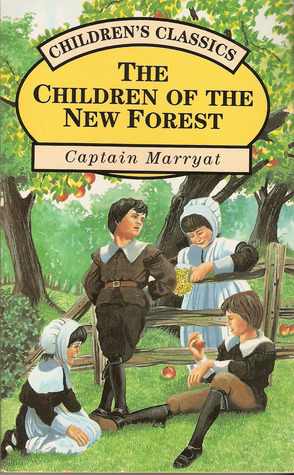 My biggest turn-about is the brother I most admired. When I was a teenager, the restless and adventurous Edward stole my heart. But this time round, I noticed how he seems to walk around with his head in the clouds, dreaming of being a hero, while Humphrey is busy making practical improvements in the short term to keep them all alive. The younger bro seems by far the more intelligent, humble and creative of the pair. He gets ideas from books and improvises with whatever's on hand. In fact, lack of resources is just a fun challenge for him. He revolutionises the cottage, figuring things out from personal observation, trial and error. And above all, he's content to be overshadowed by his brother, and not the sort to be seduced by promises of glory. Humphrey, I've got to say, you're the man!
My biggest turn-about is the brother I most admired. When I was a teenager, the restless and adventurous Edward stole my heart. But this time round, I noticed how he seems to walk around with his head in the clouds, dreaming of being a hero, while Humphrey is busy making practical improvements in the short term to keep them all alive. The younger bro seems by far the more intelligent, humble and creative of the pair. He gets ideas from books and improvises with whatever's on hand. In fact, lack of resources is just a fun challenge for him. He revolutionises the cottage, figuring things out from personal observation, trial and error. And above all, he's content to be overshadowed by his brother, and not the sort to be seduced by promises of glory. Humphrey, I've got to say, you're the man!I was still fond of Edward though, because in all his crusader's zeal and getting people's backs up, he's so human. A couple of other reviewers commented that he's a bit of an idiot at times, which is fair enough, since even his best friends agreed. They expressed it a bit less bluntly though.
'You have been more bold than prudent, Edward.'
Or, 'For these times, you are much too frank and impetuous. This is not the time for people to give vent to their feelings and opinions.'
Or, 'Do you not see you do your cause more harm than good?'
Or, 'Be no longer rash and careless in avowing your opinion.'
In Edward's defense though, he isn't arrogant, and is quick to recognise wise advice and take it on board, even when it comes from younger siblings or men supposedly on the other side of the political spectrum. It's written so that even if you think he's an idiot, he grows on you, and you still want the best for him. (And you can't go past the girl he falls in love with for foolishness, notably in a decision she makes towards the end. I felt like shaking her. But she's a product of her time.)
A couple of other characters they met along the way were among my favourites. The kids accidentally trap a gypsy boy named Pablo, who proves to be a staunch friend and honorary family member, and adds comic relief with his matter-of-fact comments and occasional efforts to shirk intense labour. But one of the best characters by far is Mr Heatherstone, the Parliamentarian who's been appointed superintendant of the forest. Edward and the others must learn to trust him as a friend, even though he presents as an enemy. But Heatherstone is playing a most daring and clever double agent game. It's worthy of Severus Snape, and he grows really fond of Edward as a bonus :)
 I noticed that some of the most critical reviewers dissed this book based on 21st century ethics, which we could hardly expect an author from Captain Marryat's era to share. Sure, the girls tend to be sidelined by the boys, and there seems to be a fixed mindset that the quality of a person corresponds with the class into which he's born. ('Edward appeared as he was, a gentleman born, and that could not be concealed under a forester's garb.') Yet I believe it's unfair to label the author as a chauvinist or social snob, when he was probably one of the most open-hearted, generous and liberal thinkers of his time. I think the best way to get the most out of this book is to suspend our modern scruples and approach it as an eye-opening step back in time when people thought differently. Then there's all sorts of treasures to pick up.
I noticed that some of the most critical reviewers dissed this book based on 21st century ethics, which we could hardly expect an author from Captain Marryat's era to share. Sure, the girls tend to be sidelined by the boys, and there seems to be a fixed mindset that the quality of a person corresponds with the class into which he's born. ('Edward appeared as he was, a gentleman born, and that could not be concealed under a forester's garb.') Yet I believe it's unfair to label the author as a chauvinist or social snob, when he was probably one of the most open-hearted, generous and liberal thinkers of his time. I think the best way to get the most out of this book is to suspend our modern scruples and approach it as an eye-opening step back in time when people thought differently. Then there's all sorts of treasures to pick up. The courteousness of everyday speech is a highlight for me. I love it that these teenagers throw around such cool words in normal conversation as importunity, assiduity and inimical, and it flows so naturally without seeming at all forced. Even when they're insulting their enemies or teasing each other, the language is just beautiful. It made me a bit sad for the woeful deterioration of young people's vocabularies. Maybe it takes reading a book like this to show how low it's sunk.
I love the simple faith of their time and place. There was evidently no church service, but Jacob's first thought was, 'I can't teach them much, but I can teach them how to fear God. We must get on how we can, and put our trust in Him who is father to the fatherless.' And the Beverley kids keep up their private devotions after his death, remaining devout in their youthful way, without being overly pious.
 The parts about the four of them adapting to their rural lifestyle are fun, interesting, and arguably the best thing that could have happened to them. Learning to be self-sufficient rather than waited on by servants for all things is a great advantage. For Humphrey and Alice in particular, being self-taught opens up a whole range of fantastic talents they might never have tapped into in their old lives. The lifestyle is described in one place as 'Arcadian.' In our fast-paced digital age, reading about four teens who live a hidden, quiet life, mainly concerned with subsisting adds a perspective that's probably good for us.
The parts about the four of them adapting to their rural lifestyle are fun, interesting, and arguably the best thing that could have happened to them. Learning to be self-sufficient rather than waited on by servants for all things is a great advantage. For Humphrey and Alice in particular, being self-taught opens up a whole range of fantastic talents they might never have tapped into in their old lives. The lifestyle is described in one place as 'Arcadian.' In our fast-paced digital age, reading about four teens who live a hidden, quiet life, mainly concerned with subsisting adds a perspective that's probably good for us.There's a bit too much about acquiring venison for my personal taste. I'd obviously forgotten how many times deer and other animals were simply wounded rather than killed outright :( But overall, I couldn't put the book down when it came to the last few chapters, which is the sign of a great storyteller in any era. If a conventional handsome, strong, ambitious and plain-spoken main character like Edward isn't enough to tempt you, I'd encourage you to read it for the sake of the hidden heroes, Humphrey, Pablo and Heatherstone.
Published on February 06, 2018 10:00
February 1, 2018
Stories with Libraries and Librarians

Libraries are among my favourite places to visit. They may be quiet and leisurely on the surface, but what can be more exciting to a bookworm than thousands of tantalising spines on shelves, whose titles all seem to cry, 'Choose me'? And what could hold more compressed fun and wisdom from generations of thinkers? In The Great Divorce, C.S. Lewis imagines them as places where the anxious ghosts of dead authors hover to see if people are still reading their books. I wouldn't be at all surprised. Anyway, I believe a library probably has more potential to change an individual's life than a therapist's office.
Here are some of the best libraries I've come across in the pages of books. The sample I've chosen is very appealing (except for the scary ones!) and will hopefully bust the stereotype of librarians as cross little old ladies with tight buns who always say, 'Shush.'
I'll start my list with a few impressive, historical and literary libraries.
1) The Great Library of Alexandria
Julius Caesar was the bad guy in this true story. This wonderful centre of knowledge stood in Egypt in the 3rd century BC. It was one of the most significant libraries in the world, dedicated to the Muses and full of papyrus scrolls. Perhaps that's why it caught fire so easily, when the Roman army set their torches to it. Even though it hasn't existed for centuries, this library is one of the most famous symbols of the pointless destruction of culture, making future generations of readers and scholars groan.
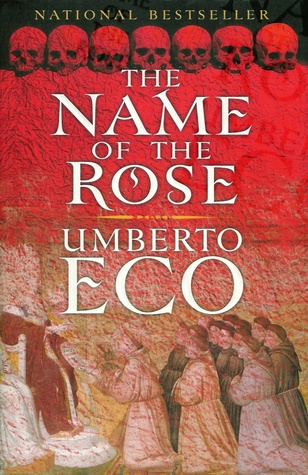
2) The Name of the Rose
Any reader of this medieval whodunit would fancy a jaunt through this library. It sits in a fortified tower of the Abbey in the form of an impossible labyrinth which only the librarian and his assistant may enter. Other monks must send requests for the books they wish to read, which are only granted if the librarian thinks they're justified. Needless to say, he wields quite a bit of klout.
But libraries from fantasy stories may be some of the most appealing to our curiosity and wonder.
3) Phantastes
This library in George MacDonald's wordy classic is one I'd love to visit if I could be sure to get hold of the right books. The hero, Anados, discovers that they draw you into their pages so that all of your five senses feel as if they're experiencing exactly what you're reading about. That takes interactive books to whole new level. (Click for more about this classic)
4) The Hogwarts Library
 It's located off a corridor on the first floor, and contains thousands of shelves of magic books for students to borrow, under the watchful eyes of Madam Pince. Only the Restricted Section is off bounds, especially to younger students, with the rare and dangerous secret knowledge it holds. It's the only spot in school which ever tempts Hermione Granger to break the rules, which she does whenever something really important needs to be researched. Anyone sneaking around in there without permission needs to handle the books very carefully, since some of them are jinxed with spells that might make them snap or scream.
It's located off a corridor on the first floor, and contains thousands of shelves of magic books for students to borrow, under the watchful eyes of Madam Pince. Only the Restricted Section is off bounds, especially to younger students, with the rare and dangerous secret knowledge it holds. It's the only spot in school which ever tempts Hermione Granger to break the rules, which she does whenever something really important needs to be researched. Anyone sneaking around in there without permission needs to handle the books very carefully, since some of them are jinxed with spells that might make them snap or scream.
5) Mr Norrell's Library
The wily old owner of this library has made sure it's one of a kind. Determined to be Britain's only magician, Mr Norrell has taken pains to acquire all the out-of-print old books of magic he can get his greedy hands on. There are thousands of rare gems, and nobody else can even find their way to his library, let alone read anything, since he's jinxed the route with several false passages. Norrell's frustrated former student Jonathan Strange gets his own back in a fit of temper by re-arranging the passages so that for one terrifying hour, Norrell can't find his way to his own library. (Here is my review.)
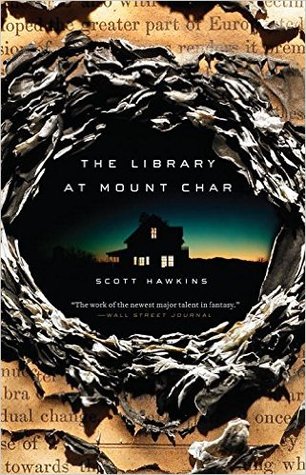
6) The Library at Mount Char
It's a sinister tale in which a ragtag group of vulnerable orphans are adopted by a formidable being known to them as 'The Father.' His library holds the secret to his power, and he forces the children to become specialist librarians, each mastering one particular area of knowledge.
7) Library of Souls
 It's not books stored in this creepy subterranean library but human souls in jars, for other Peculiars to borrow in their time of need. The evil megalomaniac Caul wants nothing more than to get his hands on them all for himself, and forces our hero Jacob Portman into the library with him, since Jacob's special gift means he's the only one able to see the jars. (My review is here.)
It's not books stored in this creepy subterranean library but human souls in jars, for other Peculiars to borrow in their time of need. The evil megalomaniac Caul wants nothing more than to get his hands on them all for himself, and forces our hero Jacob Portman into the library with him, since Jacob's special gift means he's the only one able to see the jars. (My review is here.)8) The Librarian
Perpetual student Flynn Carsen has no idea what he's in for when he applies for a job at the Metropolitan Public Library. He's hired to protect several magical and historical artifacts such as Pandora's Box and Excalibur. It's perhaps your ultimate responsible job. A serious theft has left Flynn dashing desperately across the world, relying on his extensive book knowledge to save the day.
9) The Time-Traveler's Wife
Henry deTamble is a librarian who has a genetic condition which forces him to travel to different stages of his own life, leaving just a pile of the clothes he was wearing behind him. Luckily for him it never seemed to happen in the library while he was making a presentation to special interest groups. (Here is my review.)
Here's a couple of appealing stories that feature quite normal libraries, and the impact they have on the characters. Some of them are more obscure stories which I've enjoyed.
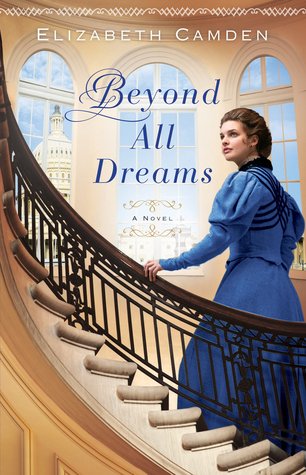 10) Beyond all Dreams
10) Beyond all DreamsThis is a sensitive story about a research librarian named Anna, who archives maps. She notices some inconsistencies in a document about a shipwreck on which her father supposedly drowned. Making a report turns out to open a tinder box of nasty facts which people in high places would have preferred to keep hushed up. Anna's experience proves that on rare occasions, a librarian may actually be a hazardous occupation. (I've reviewed it here)
11) Wonderland Creek
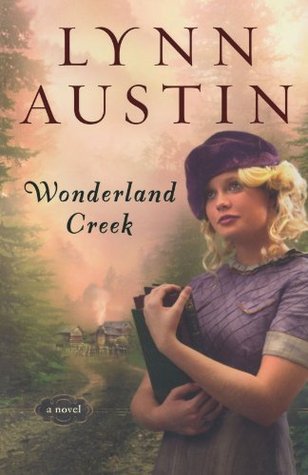 Another heroine who made a similar discovery was Alice, a timid bookworm who hated taking risks. But when her library job forces her to deliver some boxes of donated books to a tiny hillbilly community, she's roped into being a mobile librarian who must visit potentially cutthroat and dangerous places on her rounds.
Another heroine who made a similar discovery was Alice, a timid bookworm who hated taking risks. But when her library job forces her to deliver some boxes of donated books to a tiny hillbilly community, she's roped into being a mobile librarian who must visit potentially cutthroat and dangerous places on her rounds.12) Pollyanna's Western Adventure
It's one of the charming adventures of glad girl Pollyanna which has sadly gone out of print, but there are probably still a few old volumes floating around. One is in my bookshelf, since my mother owned it as a girl. Pollyanna's little family is forced to go and live out in the sticks for her husband Jimmy's job as an engineer. She gets the opportunity to set up a lending library from the books she brings from home. The locals are always glad to see her coming, and no wonder. A smiling, friendly face combined with a load of books would have to be a winning combination.
13) The Ladies of Ivy Hill
In this village chronicle, a small lending library is set up by Miss Rachel Ashcroft. She's never been a reader, but all her father has left her in his will is his huge collection of books, so she feels forced to make the best of an undesirable situation. Of course we book lovers know that having lots of books around isn't a bad thing at all, and wait for her to find out too. (See here for here.)
14) All of a Kind Family
This vintage kids' series is about five young sisters ranging in age from 4 to 12. When Sarah, the middle girl, loses a library book, she and her sisters go cringing to the librarian, expecting her to be a dragon who will severely punish them. Instead, they're relieved by her kindness and come out with a renewed zeal to borrow books.
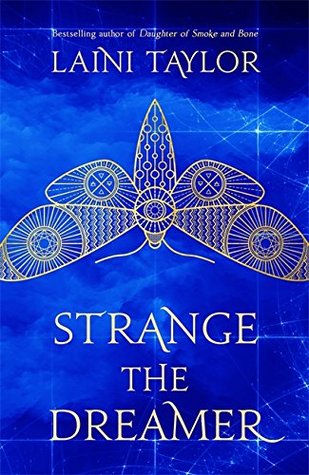 I've saved one of my favourites until last, because it pulls together such a lot of elements that make library stories so great. It's a fantasy novel which makes the benefits of a good library clear for anyone who has the curiosity and nous to use it well.
I've saved one of my favourites until last, because it pulls together such a lot of elements that make library stories so great. It's a fantasy novel which makes the benefits of a good library clear for anyone who has the curiosity and nous to use it well. 15) Strange the Dreamer
The hero is surely one of the cutest young librarians to be found in any story. Lazlo Strange was a 13-year-old war orphan apprenticed to work at the Great Library in the Kingdom of Zosma, which is described as a haven for poets, astronomers and every shade of thinker between. The wise senior librarian Master Hyrrokkin said, 'The library knows its own mind. When it steals a boy we let it keep him.' A few years later when he's grown up, the sweet little bookworm must convince a mighty warrior that his own nerdy, bookish knowledge will come in handy for a great expedition. (And here is my review.)
I know my list of literary libraries is probably just scratching the surface, so if I've overlooked any good ones you can think of, please add them in the comments.
Published on February 01, 2018 12:36
January 29, 2018
'Jonathan Strange and Mr Norrell' by Susanna Clarke
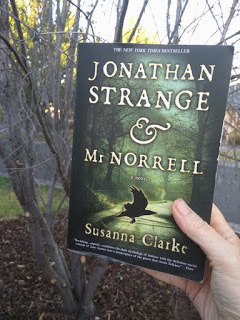
Sophisticated, witty, and ingeniously convincing, Susanna Clarke's magisterial novel weaves magic into a flawlessly detailed vision of historical England. She has created a world so thoroughly enchanting that eight hundred pages leave readers longing for more.
English magicians were once the wonder of the known world, with fairy servants at their beck and call; they could command winds, mountains, and woods. But by the early 1800s they have long since lost the ability to perform magic. They can only write long, dull papers about it, while fairy servants are nothing but a fading memory.
MY THOUGHTS:
People say that every new author needs a fresh voice. Clarke surely has one, but part of her uniqueness comes from closely copying long gone masters of the Victorian genre, as contradictory as that sounds. She has Jane Austen's witty conversations and wise social satire down pat. And she's also nailed Charles Dickens' enormous community scope and wide range of characters. It's a bit like reading either one of those two, but on top of that, there's amazing fantasy!
Clarke presents England in the Napoleonic Wars just as it was, with appearances from the Duke of Wellington, Lord Byron and mad King George III. But history gets an alternative twist with the addition of two magicians who are highly valued contributors to the war effort. They are both trying hard to raise the public profile of magic so it's on a par with the army, church or politics as a potential occupation.
Mr Gilbert Norrell is a pedantic old scholar who's addicted to hoarding knowledge, because he can't trust others to wield such a powerful tool. In reality he's a control freak with a compulsion to stay on top of what's going on. For years his main hobby has been buying valuable, out-of-print books of magic to hide in his own personal library so nobody else can read them.
Jonathan Strange is a capricious and impulsive young man who's always found it hard to settle down to anything, but discovers a sudden genius for magic which impresses Norrell as the real deal. Norrell offers to be his tutor so he can control Strange's talent and direct it to suitable channels.
Their utterly different learning styles really appealed to my homeschooling heart. Norrell considers a decade of study to be merely scratching the surface, while Strange whips off articles the night before they're due. Norrell wants to wrap his intellect around the ins and outs of everything, while Strange isn't afraid to follow his instincts and see what happens. Norrell is careful to handle with kid gloves things he only partially understands, while Strange longs to dive right in for the same reason. The discord makes an excellent read, especially since Strange knows very well that there are thousands of books Norrell is withholding from him, choosing to keep a tight rein over the nuggets of knowledge he chooses to dispense.
There are strong dangers of dabbling around in the murky supernatural. Even though Strange and Norrell are devoted fanatics, they unleash perils of which they are both oblivious and almost destroy the lives of certain other characters. This is particularly true when it comes to enlisting the help of the fairy kingdom.
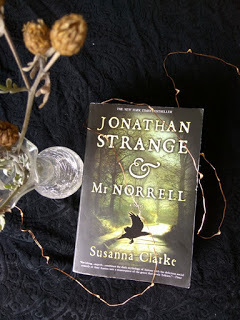 People are fascinated with elusive fairies and the possibility of winning their favour or servitude. Yet fairies prove to be a malicious and loathsome race, devoid of human empathy. Especially one manipulative character who is mostly referred to as 'the gentleman with the thistledown hair.' Totally self-interested and calculating, he reminds me of folklore villains like Rumplestiltskin, with his, 'What's in it for me?' attitude. We have to find out whether Strange and Norrell can eventually foil him, since they've no idea what's going on beneath their own noses. He's so much more cluey than either of them in many ways, it would seem that if they do, it'd have to be by accident. I found this guy really nasty, but also sort of cool.
People are fascinated with elusive fairies and the possibility of winning their favour or servitude. Yet fairies prove to be a malicious and loathsome race, devoid of human empathy. Especially one manipulative character who is mostly referred to as 'the gentleman with the thistledown hair.' Totally self-interested and calculating, he reminds me of folklore villains like Rumplestiltskin, with his, 'What's in it for me?' attitude. We have to find out whether Strange and Norrell can eventually foil him, since they've no idea what's going on beneath their own noses. He's so much more cluey than either of them in many ways, it would seem that if they do, it'd have to be by accident. I found this guy really nasty, but also sort of cool.Anyone who attempts to read the book will quickly discover its main quirk, which is all the footnotes! They basically tell the history of English magic from the world Susanna Clarke has made up especially for this novel. Sure, they distract from the flow of the story, but you can't possibly skip them without sacrificing what's so precious to Strange and Norrell, including the hazy, centuries old legends about John Uskglass, an ancient magician and monarch known as The Raven King. Some of them are weird and whacky enough to make novels of their own. So much ingenuity has gone into them, if you love the book you've got to love the footnotes. (Although I admit my heart sometimes failed me when I turned a page and saw the size of one to come.)
My final verdict is that it's dense, brain-bending and long enough, at almost 900 pages, to feel we've been sucked into Faerie ourselves, and wonder when we'll emerge. There are dazzling enchantments and many episodes as circuitous as the passages to Norrell's library which turn out to be mainly scene setters, or to keep the tantalising real action at bay. But all this makes it the sort of book we can be proud of ourselves for finishing. On the whole it's rewarding enough to make up for its brick-like quality, since there are at least a couple of things to grin at on every page. When you add them all together, that's a lot of smiles :)
And I'll finish off with some quotes from my new favourite, Jonathan Strange.
Lord Wellington: Can a magician kill a man by magic?
Strange: I suppose a magician might. But a gentleman could not.
Jonathan Strange (to the king): Though Great Britain may desert us, we have no right to desert Great Britain. She may have need of us yet.
Published on January 29, 2018 10:00
The Vince Review
Author, blogger, reader, reviewer, mother of three. All this goes under the mantle of 'stay at home mum'. I also love walking and cooking when the mood strikes me. Getting stuck into a good book has a
Author, blogger, reader, reviewer, mother of three. All this goes under the mantle of 'stay at home mum'. I also love walking and cooking when the mood strikes me. Getting stuck into a good book has always been one of the best things ever.
I invite you to treat this blog like a book-finder. People often ask the question, "What should I read next?" I've done it myself. I try to read widely, so hopefully you will find something that will strike a chord with you. The impressions that good books make deserve to be shared.
I read contemporary, historical and fantasy genres. You'll find plenty of Christian books, but also some good ones from the wider market. I also read a bit of non-fiction to fill that gap between fiction, when I don't want to get straight on with a new story as the characters of the last are still playing so vividly in my head. ...more
I invite you to treat this blog like a book-finder. People often ask the question, "What should I read next?" I've done it myself. I try to read widely, so hopefully you will find something that will strike a chord with you. The impressions that good books make deserve to be shared.
I read contemporary, historical and fantasy genres. You'll find plenty of Christian books, but also some good ones from the wider market. I also read a bit of non-fiction to fill that gap between fiction, when I don't want to get straight on with a new story as the characters of the last are still playing so vividly in my head. ...more
- Paula Vince's profile
- 109 followers



